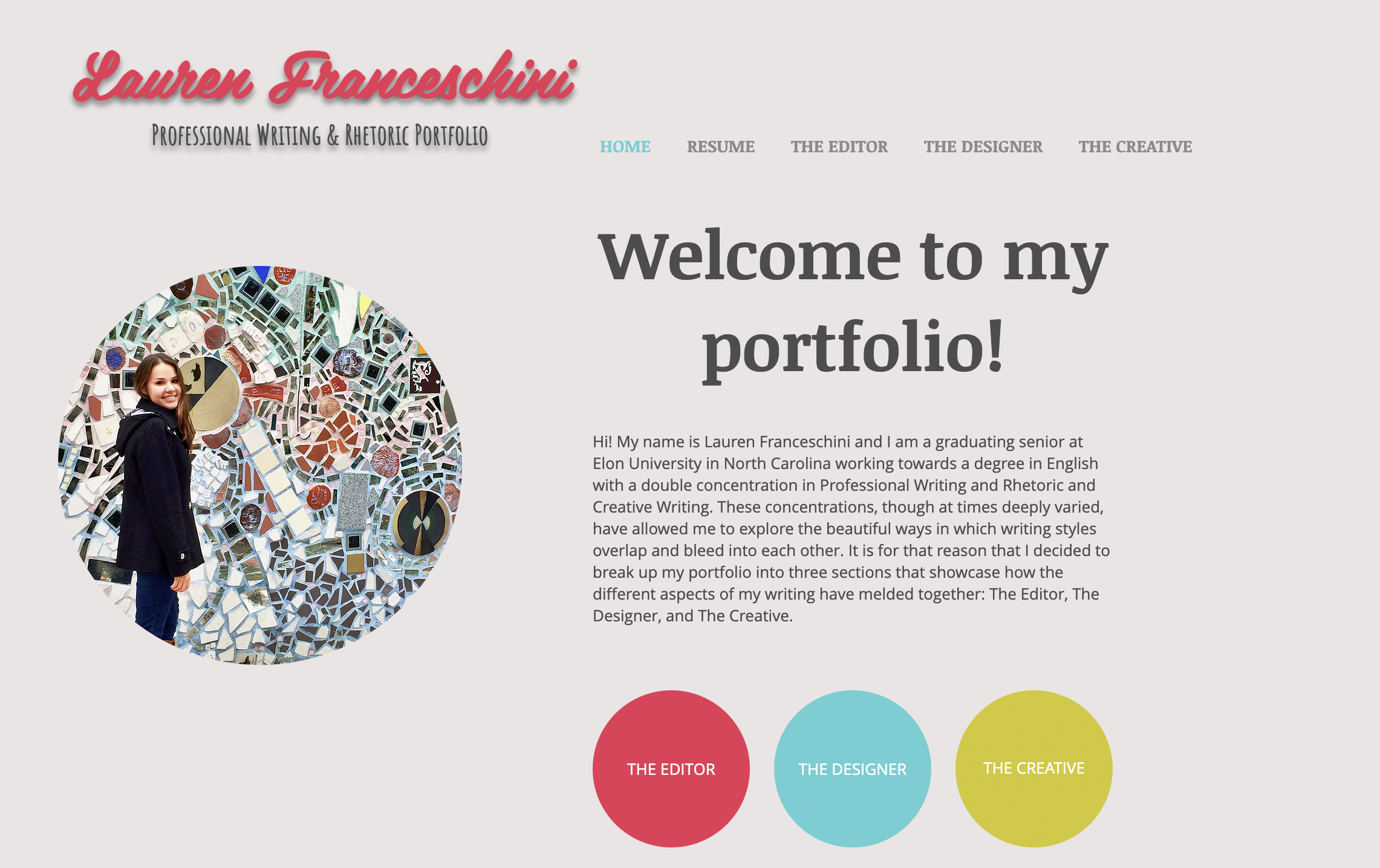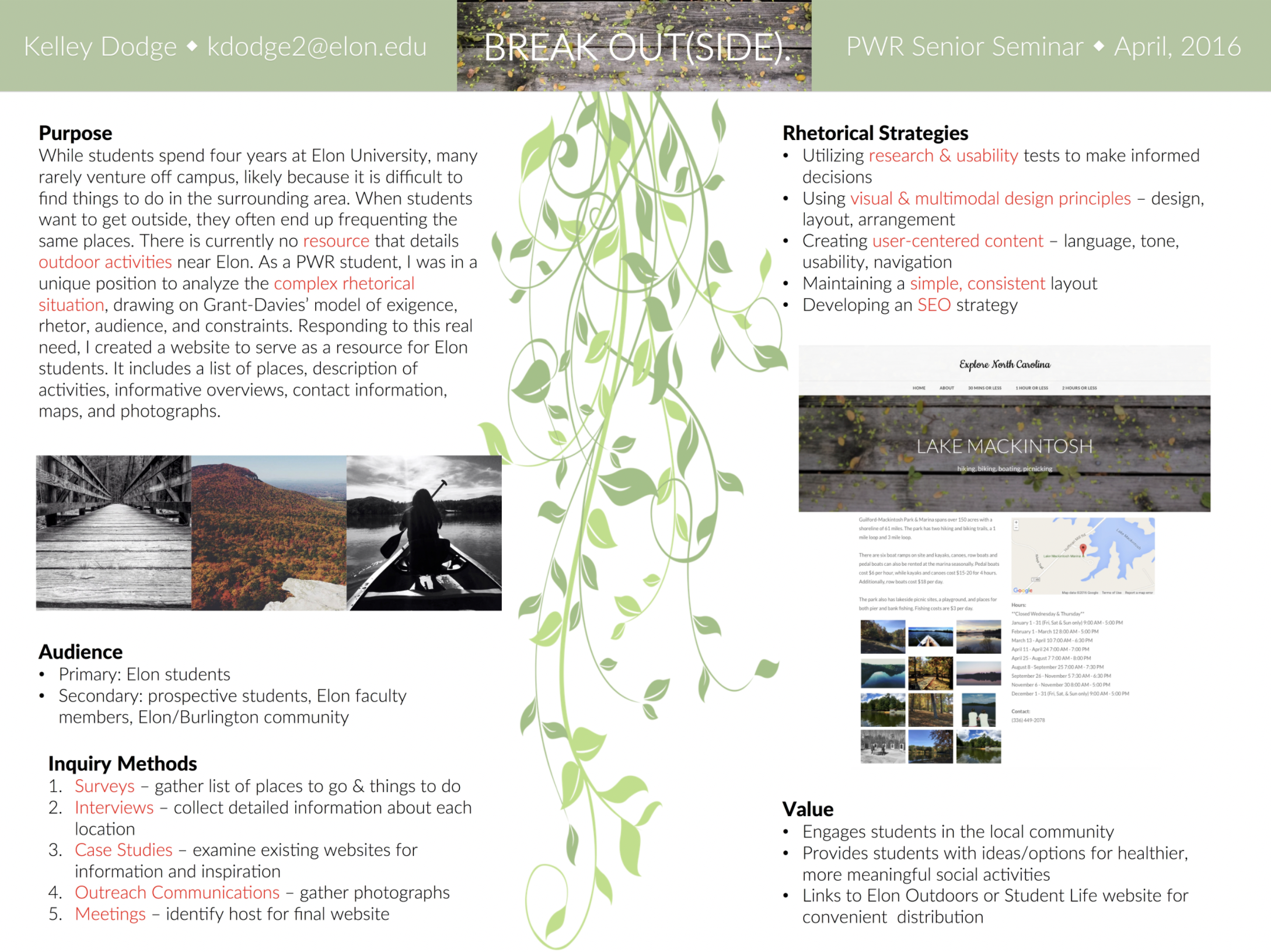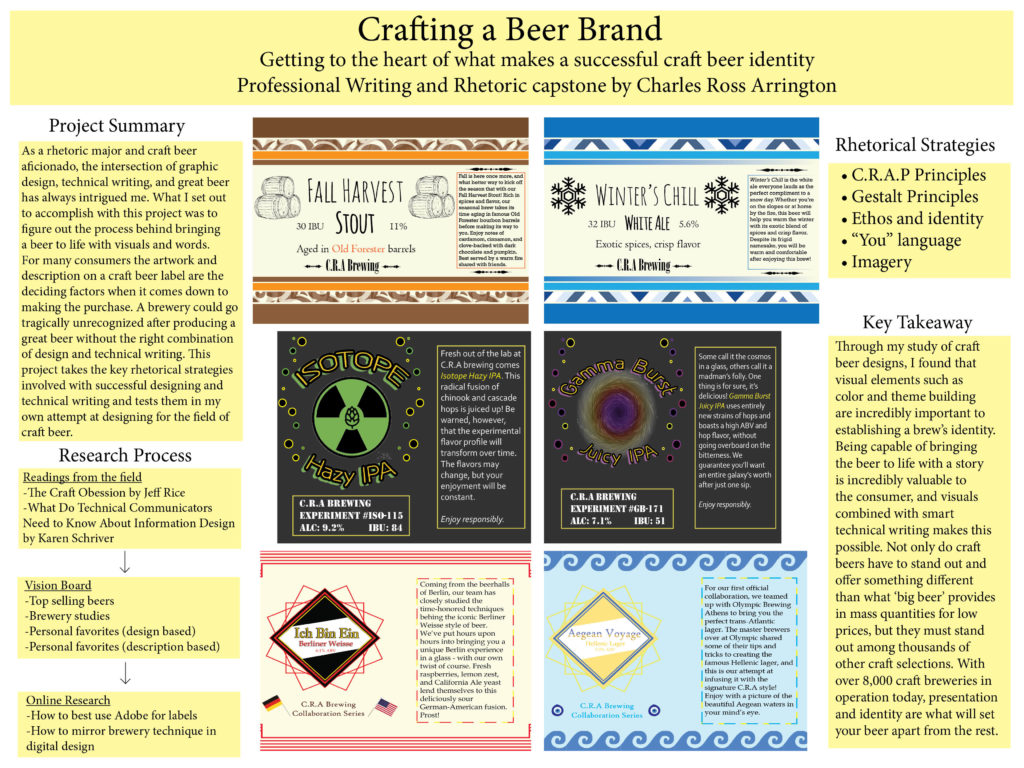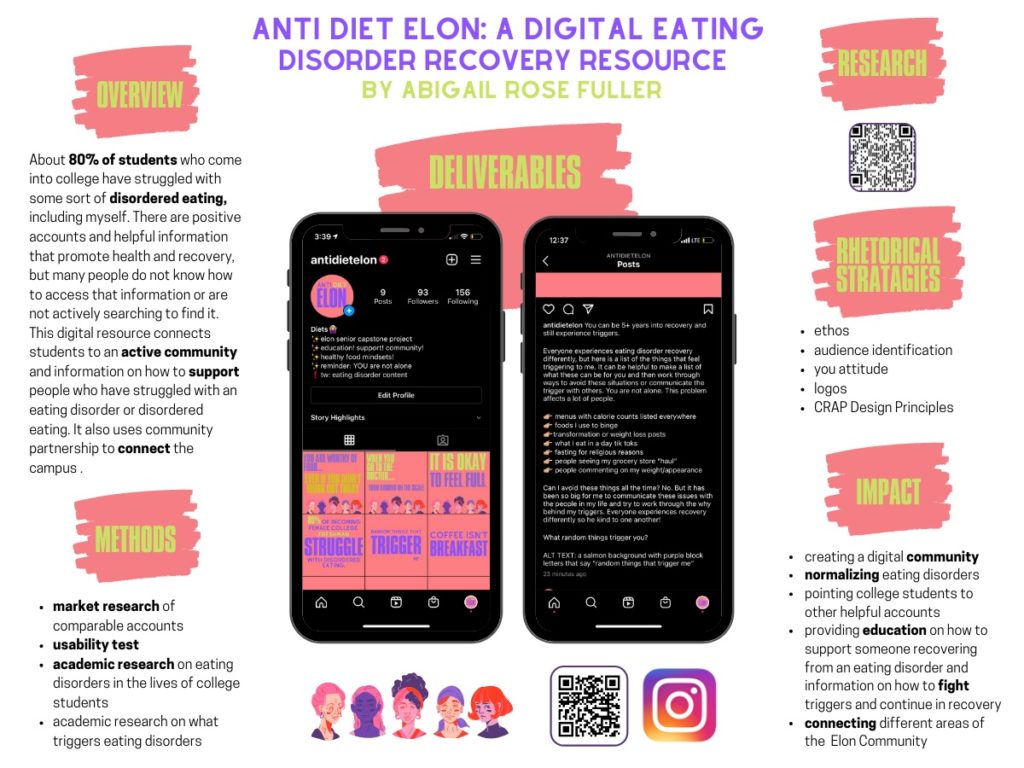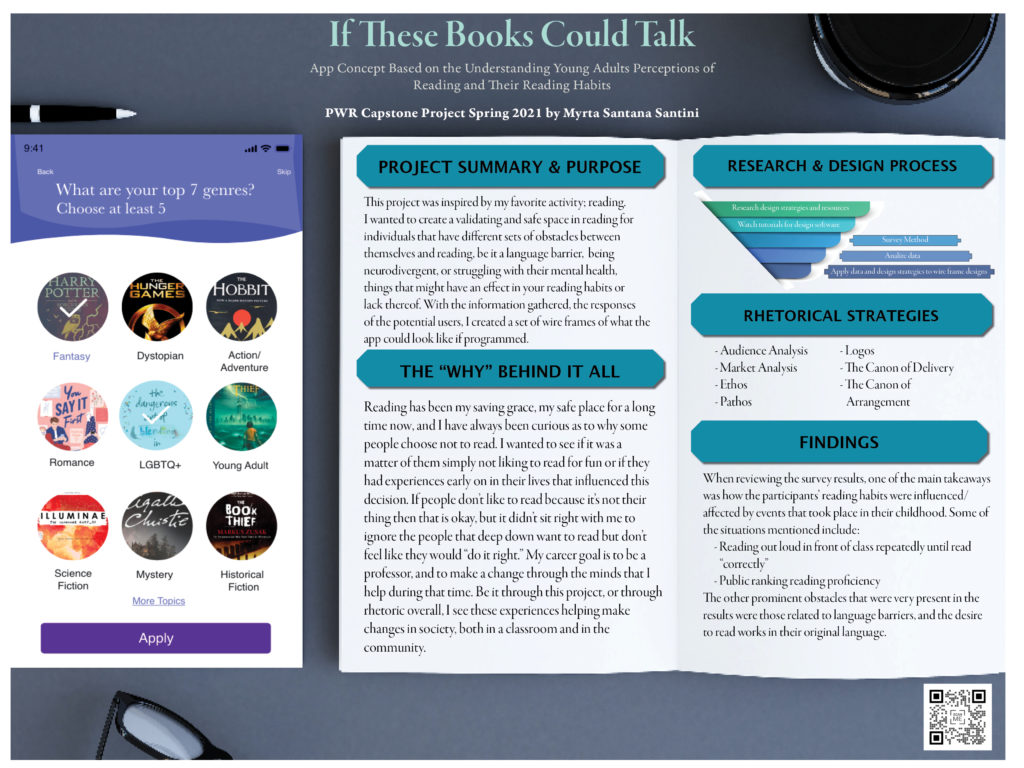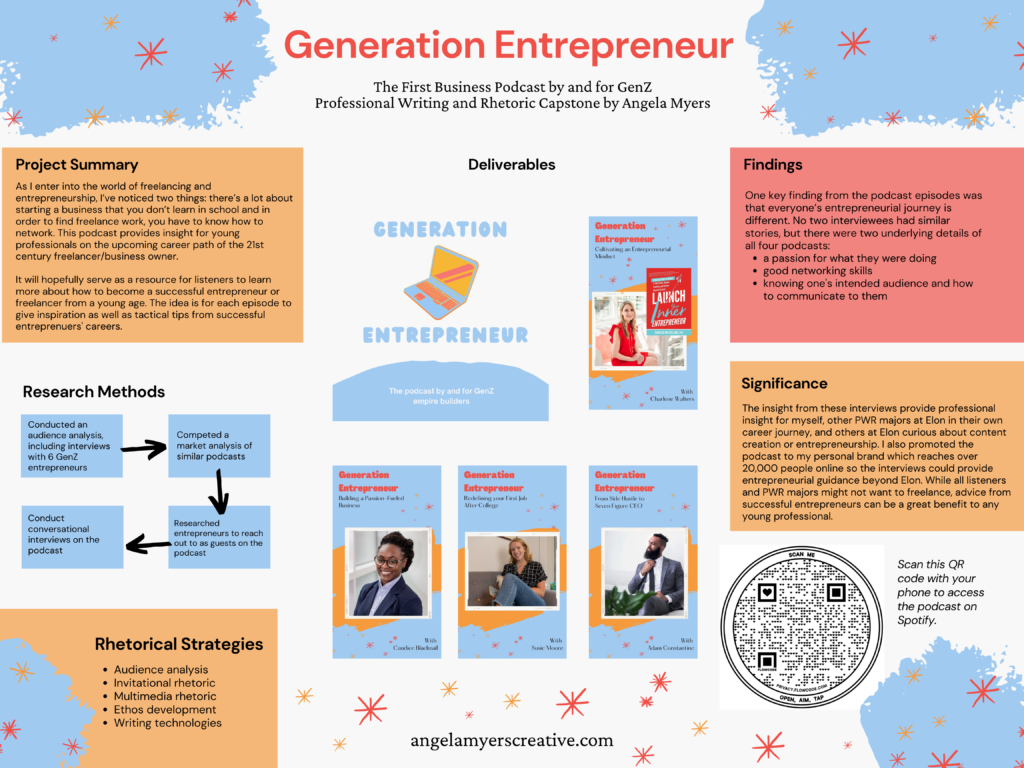The PWR major has several experiential learning elements, including one PWR internship and one PWR research experience. A PWR major must have two credit hours of both internship and research experiences to graduate. Additionally, PWR majors must complete a senior portfolio as well as a senior Capstone Project, which are meant to represent the cumulative knowledge gained throughout their experience in the PWR program. The PWR program’s experiential learning and portfolio/Capstone Project requirements are designed to prepare students for a career in Professional Writing. Internship and research experience allow students to see how the skills acquired in PWR can be transferred into a professional environment. The senior portfolio and Capstone Project are helpful as they provide students with a conglomeration of their work and synthesis of their professional writing skills which can be added to future resumes and job applications. Students pursuing a PWR degree as well as undecided students interested in a writing-based program can benefit greatly from these experiences, as they provide the opportunity for hands-on practice in a PWR-based field. While these PWR major requirements are incredibly valuable to future professional pursuits, they may seem daunting to sophomores and juniors pursuing a degree in PWR. Luckily, Elon’s PWR program has a multitude of resources meant to help students fulfill these program obligations.
Internships
PWR internships are meant to be an exciting opportunity to see how the skills learned in PWR courses can be translated into a fulfilling career. Despite the many possibilities offered by internships, some students worry about the requirement as they do not know where to start their internship search. One way for you to get on top of their internship requirements is by reaching out to PWR faculty and advisors, who are well equipped to help you find a suitable internship. There are many internships available on campus that count towards the PWR internship requirement. In the past, students have interned as social media managers for various student organizations and publishers for campus institutions such as the Center for Engaged Learning (CEL). PWR major Liz Crouse undertook the publishing internship for the CEL last year, and her experience is documented on Elon’s CUPID Blog site for those interested to see what the job entails. If you would rather gain their internship experience in a workplace environment, the Elon Job Network offers the opportunity to search for PWR-related internships on various work sites including law firms, tech firms, advertising agencies, publishing companies, TV stations, and more. PWR faculty and advisors are more than willing to help find an off-campus internship that aligns with your future career interests, so don’t be afraid to reach out for help if you are feeling overwhelmed. For more information on the PWR internship requirement, visit the PWR program internship page.
Research
The research component of the PWR major offers students the opportunity to bolster future portfolios while gaining hands-on experience with various professional writing genres and research methods. Many professors within the PWR program double as mentors for ongoing research opportunities that are available to PWR students. An example of one of these projects is the Highway 64/NC Climate Project, which is spearheaded by Dr. Strickland. This project allows student researchers to travel the length of NC, connect with students from other universities as well as local politicians, farmers, journalists, and environmentalists to document how NC is adapting to climate change. The Center for Writing Excellence also offers several research opportunities for PWR students, including alumni writing projects, faculty and staff writing group projects, and non-academic writing projects. To learn more about these experiences, reach out to Dr. Rosinski. There are several other research project opportunities outlined on the PWR undergraduate research page, so be sure to check them out if you are worried about your research requirement. You can also talk to PWR professors and advisors if you aren’t sure which research opportunity aligns best with your interests and skills. For additional information on research opportunities, be sure to check out the CUPID Blog for student perspectives on various undergraduate research projects.
Senior Portfolio
The PWR’s senior portfolio is designed to showcase a student’s development over time as well as their current level of achievement. Portfolios are a collection of drafts and final projects which are reflective of your academic achievements as well as your future career aspirations. PWR portfolio drafts are due to Dr. Li on the first Monday of October of your senior year, and the final revised copy is due on November 30th of the same year. Your senior portfolio will then be evaluated by an external reviewer who is not associated with the PWR program. Many PWR alumni have noted that their senior portfolios helped them stand out from other candidates throughout their job search after graduation. In your portfolio, you should showcase the work that you are most proud of. So long as a document is representative of the skills you learned in the PWR program while also proving your capabilities for a specified career, it can be included within your portfolio. This can include projects done in PWR courses, articles written for student organizations, or reports and texts from your internship and research requirements. A good way to get on top of your senior portfolio requirement is by saving PWR-related texts and projects early on. You can store these documents in a folder on your Google Drive or Microsoft Office so they are there when you begin constructing your digital portfolio. You can also begin working with your faculty mentor as early as your Sophomore year to begin preparing your portfolio. To get an idea of what is expected of your senior portfolio requirement, visit the PWR Portfolio page, which has examples of previous student portfolios that you can use as inspiration. If you have a working portfolio by the Spring semester of your Junior year, you are eligible to submit your work for a chance to win the Junior ePortfolio Award. This honor (along with $500) is awarded to an outstanding portfolio-in-progress by a current junior majoring in PWR or English, or minoring in PWS. Submissions are due by the third Monday of April, which will be April 22nd of 2022.
PWR Senior Capstone Project
A final requirement of the PWR program is the Senior Capstone Project. This research-based project is part of the Senior Seminar that PWR students are required to take in the Spring semester of their senior year. The Senior Capstone Project is meant to showcase the knowledge and skills of rhetorical, professional, and design strategies that a student learns throughout their time in the PWR program. The Capstone is an integrated portion of the senior assessment process, and students present their projects at an open-house-style Spring Undergraduate Research Forum (SURF) at the end of the semester to faculty and other audiences. More information about the requirements of the Senior Capstone Project as well as examples of previous students’ Portfolio Projects can be found on the PWR Senior Capstone Project page of Elon’s PWR department website. Undergraduate students are also encouraged to go to Senior Capstone Project showcases at SURF each spring to get an idea of what will be expected of them.
It is beneficial for PWR students to be proactive about the four major PWR requirements. Be sure to reach out to PWR professors and upperclassmen early on, and begin preparing documents for your senior portfolio as soon as possible. This will help alleviate your senior year workload while ensuring that only your finest achievements are included in your portfolio. Talk to PWR faculty and advisors about research and internship opportunities, they will be able to help you figure out what experiences will be best suited to your needs and aspirations. The PWR major requirements are not meant to be daunting. They are designed to help you become successful in a career you are passionate about by preparing you for the post-graduation job search and making you familiar with how PWR is used in the real world. If you feel stressed about any of these components of the PWR program, reach out to your faculty advisor and begin planning how you will fulfill the requirements.

